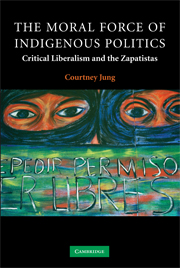Book contents
- Frontmatter
- Contents
- Acknowledgments
- Introduction
- 1 Stepping behind the claims of culture: constructing identities, constituting politics
- 2 Internal colonialism in Mexican state formation
- 3 “The politics of small things”
- 4 From peasant to indigenous: shifting the parameters of politics
- 5 The politics of indigenous rights
- 6 Critical liberalism
- Appendix: tables – indigenous population
- Bibliography
- Index
- CONTEMPORARY POLITICAL THEORY
4 - From peasant to indigenous: shifting the parameters of politics
Published online by Cambridge University Press: 14 September 2009
- Frontmatter
- Contents
- Acknowledgments
- Introduction
- 1 Stepping behind the claims of culture: constructing identities, constituting politics
- 2 Internal colonialism in Mexican state formation
- 3 “The politics of small things”
- 4 From peasant to indigenous: shifting the parameters of politics
- 5 The politics of indigenous rights
- 6 Critical liberalism
- Appendix: tables – indigenous population
- Bibliography
- Index
- CONTEMPORARY POLITICAL THEORY
Summary
As peasant identity began to lose political traction in the late 1980s and early 1990s, it was gradually supplemented and replaced by political organization around indigenous identity. Even Subcomandante Marcos, who subsequently played an important role in shaping the discourse of indigenous politics and elevating the political visibility of indigenous peoples, admits that, prior to the 1990s, “indigenous people [were] part of the community, but without any specificity. They were an exploited people – peasants – and they had to be treated like peasants” (Subcomandante Marcos, 1997a: 137). Yet as Luis Hernández Cruz explains, “Now the struggle has changed, we are fighting a new struggle … and yet still it is the same.” The new struggle he is referring to is the struggle for indigenous rights.
Like peasant identity, indigenous identity is not a permanent feature of rural Mexican politics. The sudden change in the terms of contestation caught many observers off guard. Mexican journalist and political organizer Luis Hernández Navarro worked as an advisor to a coffee cooperative in Chiapas for 10 years, meeting once a month with a core group of organizers. During those 10 years, when men rose to speak in meetings, they addressed the assembled group as compañeros – comrades – and they spoke in Spanish. In February 1994, Hernández attended the first cooperative meeting after the Zapatista uprising. As the first man rose to speak, he looked out over the group and began, “Indigenous Brothers …” – speaking not in Spanish, but in Tzeltal.
- Type
- Chapter
- Information
- The Moral Force of Indigenous PoliticsCritical Liberalism and the Zapatistas, pp. 147 - 182Publisher: Cambridge University PressPrint publication year: 2008



